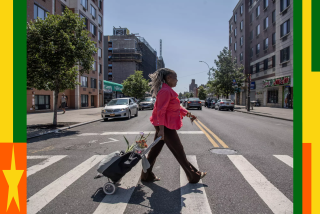The Long Road to Democracy
- Share via
Derived from the Greek demokratia , democracy in its initial form literally meant “popular rule.” Yet, through most of history, it has hardly been representative.
In the Greek city-states where it first flourished, democracy was limited to male citizens--it did not allow participation by women, slaves or resident foreigners. The minority ruled. The Roman Republic provided for popular representation--but again limited to the male elite.
Even modern democracy, which emerged in Western nation-states in the late 18th Century after the English, French and American revolutions, was exclusive. Real democratization did not begin in the United States until well into the 19th Century. Not until the 1828 presidential election--when older states abolished property qualifications and new states with universal male suffrage were admitted to the union--were more than 50% of white men allowed to vote, according to Harvard’s Samuel P. Huntington.
Globally, minorities have only been enfranchised in the 20th Century. Women in the United States, France and Switzerland still had to wait until 1920, 1945 and 1971, respectively, to win the right to vote. And unrestricted voting rights for American blacks were arguably not guaranteed until the 1960s, when Congress and the courts intervened on their behalf.
More to Read
Sign up for Essential California
The most important California stories and recommendations in your inbox every morning.
You may occasionally receive promotional content from the Los Angeles Times.












